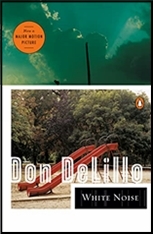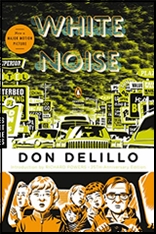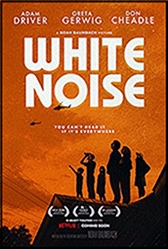Sun 19 Mar 2023
DON DeLILLO – White Noise. Wiking Press, hardcover, 1985. Penguin, softcover, 1986. Film: Netflix Studios, et al,,2022, starring Adam Driver, Greta Gerwig, Don Cheadle, Raffey Cassidy, Sam Nivola, and May Nivola; written and directed by Noah Baumbach.

The white noise is death. We try to ignore it.
Our vacuous, repetitive, ambiguous and confused suburban lives.
At least the poor can concentrate on food, shelter, the business of staying alive. Not enough time or energy left for ennui.
What if we did have time to contemplate? What would we think about?
It’s like Woody Allen’s complaint about life being a restaurant with terrible food. And such small portions!
The interminable absurdity of everyday suburban life: “The supermarket shelves have been rearranged. It happened one day without warning. There is agitation and panic in the aisles, dismay in the faces of the older shoppers. They walk in a fragmented trance, stop and go, clusters of well-dressed figures frozen in aisles, trying to figure out the pattern, discern the underlying logic, trying to remember where they’d seen the Cream of Wheat….There is a sense of wandering now, an aimless and haunted mood, sweet-tempered people taken to the edge.â€
At least the computers seem to know something. Coming to the checkout, the “terminals are equipped with holographic scanners, which decode the binary secret of every item, infallibly. This is the language of waves and radiation, or how the dead speak to the living. And this is where we wait together, regardless of age, our carts stocked with brightly colored goods. A slowly moving line, satisfying, giving us time to glance at the tabloids in the racks.â€
The tabloids. Our escape from the white noise, the confusion, the fear. The nothingness. The tabloids with the “tales of the supernatural and the extraterrestrial. The miracle vitamins, the cures for cancer, the remedies for obesity. The cults of the famous and the dead.â€
What the tabloids offer us is something to have faith in. Something bigger than us. At least somebody knows something. And if we have faith in them, we can glom onto their confidence and escape our wretched fear.
——
Professor Jack Gladney is head of his own department that he created at a small Midwest liberal arts college: Hitler Studies. Jack is quite well known and well regarded. With a certain gravitas and all knowing aura. He has it all. The wife, the kids, the house. Living the suburban dream.

But it all turns to shit when a train carrying noxious chemicals derails near Jack’s town. The whole town has to be evacuated. And due to Jack’s know-it-all ironic, laconic confidence, he’s exposed to the amorphous chemical cloud.
The nebulous cloud creates a nebulous tumor within. Or so the medical scanner technicians inform him. And he will die. No longer an abstract concept. He will die within the calculable future. A future of which he can no longer partake.
And he starts to freak out. To break down. To quiver with fear.
His wife has been taking an experimental drug to treat the fear of death. The fear of which is paralyzing her. She got access to the drug by giving her body to the pharma rep. But the drug has stopped working and the side effect erode her memory. The pills are thrown in the garbage.
Jack scavenges for the pills which he craves inconsolably. Riffling thru the garbage, seeking clues: “I found crayon drawings of a figure with full breasts and male genitals. There was a long piece of twine that contained a series of knots and loops. It seemed at first a random construction. Looking more closely I thought I detected a complex relationship between the size of the loops, the degree of the knots (single or double) and the intervals between knots with loops and freestanding knots. Some kind of occult geometry or symbolic festoon of obsessions. I found a banana skin with a tampon inside. Was this the dark underside of consumer consciousness? I came across a horrible clotted mass of hair, soap, ear swabs, crushed roaches, flip top rings, sterile pads smeared with pus and bacon fat, strands of frayed dental floss, fragments of ballpoint refills, toothpicks still displaying bits of impaled food. There was a pair of shredded undershorts with lipstick markings, perhaps a memento of [a tryst].†This latent fear, now stark and omnipresent, had been subsumed, suppressed and sublimated in Jack’s Hitler Studies:

“Helpless and fearful people are drawn to magical figures, mythic figures, epic men who intimidate and darkly loom….You wanted to be helped and sheltered. The overwhelming horror would leave no room for your own death. ‘Submerge me’ you said. ‘Absorb my fear.’…. The vast and terrible depth…The inexhaustibility….The whole huge nameless thing….The massive darkness…The whole terrible endless hugeness.â€
The only escape of fear of death? If you can’t repress it, become a killer.
“I believe, Jack, there are two kinds of people in the world. Killers and diers. Most of us are diers. We don’t have the disposition, the rage or whatever it takes to be a killer. We let death happen. We lie down and die. But think what it’s like to be a killer. Think how exciting it is, in theory, to kill a person in direct confrontation. If he dies, you cannot. To kill him is to gain life-credit. Th more people you kill, the more credit you store up. It explains any number of massacres, wars, executions…..[T]o cure themselves of death by killing others…To plot, to take aim at something, to shape time and space.â€
What Jack must do to cure death (for what is death but its fear?) is become a killer. But how?
Get back to your primordial roots. “The male animal. Isn’t there a fund, a pool, a reservoir of potential violence in the male psyche?….Isn’t there a sludgy region you’d rather not know about? A remnant of some prehistoric period when dinosaurs roamed the earth and men fought with flint tools? When to kill was to live?….homicidal rage…buried in the most prudent and unassuming soul.â€
So Jack tries to summon a homicidal level of rage for the pharma rep who screwed his wife. He gets a gun. Makes a plan. Finds the guy. And tries to make himself a killer.
—–
So that’s it, then. Ambiguity, industrial white noise and ennui. The existential crisis of the agnostic suburbanite. The suburbanite lacking faith in the tabloids, in something big and huge and strong to put your faith in. To subsume your fear.

But it’s a fear that has no primal root. If you can make of yourself a more hardboiled character. A hunter not the hunted. Who kills instead of dies. You’ll live.
——
The book is good enough. It does what it’s supposed to do. It conveys its message. But its message kinda sucks. And it’s a privileged kind of message. Not that it’s not true. I’m sure there’s a kind of truth here.
But it kind of reminds me of an interview with the director Sarah Polley recently talking about how she turned down the part of Penny Lane in the movie Almost Famous. Penny Lane was an early 70’s groupie. Polley said she simply could not, for the life of her, understand how a young woman in the early 70’s, at the height of the war protest movement, throw her life away as a groupie. So she turned it down.
My point is that I can’t understand the abstract fear of death, existential angst and ennui. I could when I was younger, in the suburbs, whatever. But now I can’t.
Brecht says: “Bread before morality.†And I guess that’s where I stand. It’s why Jean Valjean shouldn’t be prosecuted for stealing a loaf for his starving family.
How can anyone have the leisure to have poolside panic attacks about their own personal abstract mortality when people are starving, getting murdered, dying every day.
Like Hemingway quotes Donne:
Entire of itself.
Each is a piece of the continent,
A part of the main.
If a clod be washed away by the sea,
Europe is the less
As well as if a promontory were.
As well as if a manor of thine own
Or of thine friend’s were.
Each man’s death diminishes me,
For I am involved in mankind.
Therefore, send not to know
For whom the bell tolls,
It tolls for thee.
The hardboiled fare I favor doesn’t see death as an isolated, random, unlikely, angst worthy or even newsworthy thing. It’s present. All of the freaking time. So get used to it, fight it where you can, and know that in the end, life is a tragedy that ends in death. Stop complaining. Get on with it. Everything else is only so much white noise.
March 19th, 2023 at 3:40 pm
I have not read the book nor seen the movie. In fact until this morning, I did not even know that a movie had been made of the book.
And after reading your review of the book, Tony, I would have said it was impossible to make a movie of it. Have you (or anyone) seen the movie? If so, how well did they come to pulling it off?
March 19th, 2023 at 4:11 pm
Steve,
I’ve not seen the movie—though am a fan of Baumbach. Adam Driver seems to me nothing like the 50 year old husky professor of the book. I’d picture Jack Gladney as looking more like the much mourned philip Seymour Hoffman.
I’ll need to see it—but it’ll be hard to impart the metaphysical angst in visual forms. If anyone’s capable though, it’s baumbach.
March 19th, 2023 at 9:35 pm
The trailer doesn’t enthuse. I think I’d better read the book first, then decide…
March 19th, 2023 at 10:57 pm
The film trailer makes it look like a silly neurotic comedy. The book, while it contains moments of amusing absurdity—any laughs are in the form of gallows humor in the prevailing despair of the condemned. You don’t laugh at the ridiculousness of the characters. Rather, you smile, if at all, with amusement at the Armageddon coming to destroy us all.
March 20th, 2023 at 7:34 pm
A fine review of a serious novel that as the author often does touches on genre fiction while going in more serious directions.
The film doesn’t quite capture the whole feel of the book not surprisingly concentrating more on the black humor and dark satire than the more serious social commentary.
March 21st, 2023 at 8:36 am
Tony,
You touch on the reasons why its difficult for me to take much modern literary fiction (I refuse to call it literature, it’s a genre like anything else) seriously.
Now if the fear of death led him to a reckless spree, that i could relate to. I will drink/Life to the lees: All times I have enjoy’d. But this angsty whining is hard to take.
Best
Sai